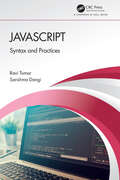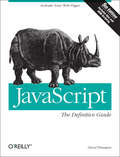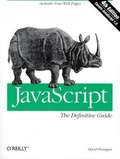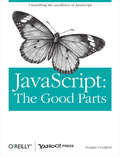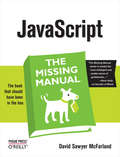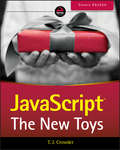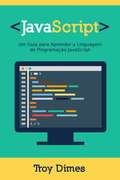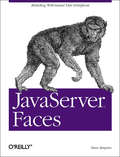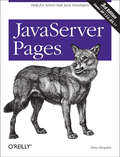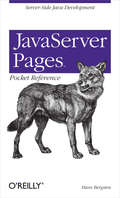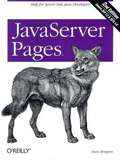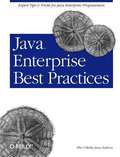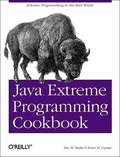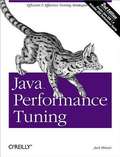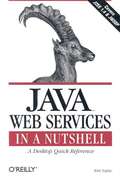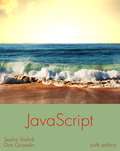- Table View
- List View
JavaScript: Syntax and Practices
by Ravi Tomar Sarishma DangiJavaScript is an easy-to-use, flexible, dynamic, prototype-based programming language predominantly used over the web. Although the initial focus of the language was to assist in the generation of dynamic web content, it soon found its way into numerous other applications. This book aims to cover the fundamentals of the language by providing a strong start for people who wish to start their journey to the JavaScript programming language. It provides the mandatory theoretical background, which is much needed for implementation of the exhaustive hands-on exercises and includes over 4000 lines of code for grasping a maximum understanding of the material. FEATURES A strong theoretical background and understanding of the fundamentals of the JavaScript language Hands-on and demo exercises at the end of every chapter Exercises, theory-based questions, MCQs and true/false questions for helping readers to evaluate their understanding from time to time A dedicated chapter providing extended case studies for using the language This book is targeted at undergraduate as well as postgraduate students who want to learn about front-end programming or who wish to learn a lightweight, easy-to-use programming language for working on their projects. For programmers having experience in other languages, it will serve as a quick summary to get a hold of a new language.
JavaScript: The Definitive Guide
by David FlanaganThis Fifth Edition is completely revised and expanded to cover JavaScript as it is used in today's Web 2.0 applications. This book is both an example-driven programmer's guide and a keep-on-your-desk reference, with new chapters that explain everything you need to know to get the most out of JavaScript, including: Scripted HTTP and AjaxXML processingClient-side graphics using the canvas tagNamespaces in JavaScript--essential when writing complex programsClasses, closures, persistence, Flash, and JavaScript embedded in Java applicationsPart I explains the core JavaScript language in detail. If you are new to JavaScript, it will teach you the language. If you are already a JavaScript programmer, Part I will sharpen your skills and deepen your understanding of the language.Part II explains the scripting environment provided by web browsers, with a focus on DOM scripting with unobtrusive JavaScript. The broad and deep coverage of client-side JavaScript is illustrated with many sophisticated examples that demonstrate how to:Generate a table of contents for an HTML documentDisplay DHTML animationsAutomate form validationDraw dynamic pie chartsMake HTML elements draggableDefine keyboard shortcuts for web applicationsCreate Ajax-enabled tool tipsUse XPath and XSLT on XML documents loaded with AjaxAnd much morePart III is a complete reference for core JavaScript. It documents every class, object, constructor, method, function, property, and constant defined by JavaScript 1.5 and ECMAScript Version 3.Part IV is a reference for client-side JavaScript, covering legacy web browser APIs, the standard Level 2 DOM API, and emerging standards such as the XMLHttpRequest object and the canvas tag.More than 300,000 JavaScript programmers around the world have madethis their indispensable reference book for building JavaScript applications."A must-have reference for expert JavaScript programmers...well-organized and detailed."-- Brendan Eich, creator of JavaScript
JavaScript: The Definitive Guide, 4th Edition
by David FlanaganThis fourth edition of the definitive reference to JavaScript, a scripting language that can be embedded directly in web pages, covers the latest version of the language, JavaScript 1.5, as supported by Netscape 6 and Internet Explorer 6. The book also provides complete coverage of the W3C DOM standard (Level 1 and Level 2), while retaining material on the legacy Level 0 DOM for backward compatibility.
JavaScript: The Definitive Guide, 5th Edition
by David FlanaganThis Fifth Edition is completely revised and expanded to cover JavaScript as it is used in today's Web 2.0 applications. This book is both an example-driven programmer's guide and a keep-on-your-desk reference, with new chapters that explain everything you need to know to get the most out of JavaScript, including: * Scripted HTTP and Ajax * XML processing * Client-side graphics using the canvas tag * Namespaces in JavaScript--essential when writing complex programs * Classes, closures, persistence, Flash, and JavaScript embedded in Java applications Part I explains the core JavaScript language in detail. If you are new to JavaScript, it will teach you the language. If you are already a JavaScript programmer, Part I will sharpen your skills and deepen your understanding of the language. Part II explains the scripting environment provided by web browsers, with a focus on DOM scripting with unobtrusive JavaScript. The broad and deep coverage of client-side JavaScript is illustrated with many sophisticated examples that demonstrate how to: * Generate a table of contents for an HTML document * Display DHTML animations * Automate form validation * Draw dynamic pie charts * Make HTML elements draggable * Define keyboard shortcuts for web applications * Create Ajax-enabled tool tips * Use XPath and XSLT on XML documents loaded with Ajax * And much more Part III is a complete reference for core JavaScript. It documents every class, object, constructor, method, function, property, and constant defined by JavaScript 1.5 and ECMAScript Version 3. Part IV is a reference for client-side JavaScript, covering legacy web browser APIs, the standard Level 2 DOM API, and emerging standards such as the XMLHttpRequest object and the canvas tag. More than 300,000 JavaScript programmers around the world have made this their indispensable reference book for building JavaScript applications.
JavaScript: The Good Parts
by Douglas CrockfordMost programming languages contain good and bad parts, but JavaScript has more than its share of the bad, having been developed and released in a hurry before it could be refined. This authoritative book scrapes away these bad features to reveal a subset of JavaScript that's more reliable, readable, and maintainable than the language as a whole—a subset you can use to create truly extensible and efficient code.Considered the JavaScript expert by many people in the development community, author Douglas Crockford identifies the abundance of good ideas that make JavaScript an outstanding object-oriented programming language-ideas such as functions, loose typing, dynamic objects, and an expressive object literal notation. Unfortunately, these good ideas are mixed in with bad and downright awful ideas, like a programming model based on global variables.When Java applets failed, JavaScript became the language of the Web by default, making its popularity almost completely independent of its qualities as a programming language. In JavaScript: The Good Parts, Crockford finally digs through the steaming pile of good intentions and blunders to give you a detailed look at all the genuinely elegant parts of JavaScript, including:SyntaxObjectsFunctionsInheritanceArraysRegular expressionsMethodsStyleBeautiful featuresThe real beauty? As you move ahead with the subset of JavaScript that this book presents, you'll also sidestep the need to unlearn all the bad parts. Of course, if you want to find out more about the bad parts and how to use them badly, simply consult any other JavaScript book.With JavaScript: The Good Parts, you'll discover a beautiful, elegant, lightweight and highly expressive language that lets you create effective code, whether you're managing object libraries or just trying to get Ajax to run fast. If you develop sites or applications for the Web, this book is an absolute must.
JavaScript: The Missing Manual (Missing Manual)
by David Sawyer McfarlandJavaScript is an essential language for creating modern, interactive websites, but its complex rules challenge even the most experienced web designers. With JavaScript: The Missing Manual, you'll quickly learn how to use JavaScript in sophisticated ways -- without pain or frustration -- even if you have little or no programming experience. JavaScript expert David McFarland first teaches you the basics by having you build a simple program. Then you'll learn how to work with jQuery, a popular library of pre-built JavaScript components that's free and easy to use. With jQuery, you can quickly build modern, interactive web pages -- without having to script everything from scratch! Learn how to add scripts to a web page, store and manipulate information, communicate with the browser window, respond to events like mouse clicks and form submissions, and identify and modify HTML Get real-world examples of JavaScript in action Learn to build pop-up navigation bars, enhance HTML tables, create an interactive photo gallery, and make web forms more usable Create interesting user interfaces with tabbed panels, accordion panels, and pop-up dialog boxes Learn to avoid the ten most common errors new programmers make, and how to find and fix bugs Use JavaScript with Ajax to communicate with a server so that your web pages can receive information without having to reload
JavaScript: The New Toys
by T. J. CrowderAll of JavaScript's newest features, in depth, made easy to understand. JavaScript is a rapidly changing language and it can be challenging to keep up with all the new toys being added. JavaScript: The New Toys explores the newest features of the world's most popular programming language while also showing readers how to track what's coming next. After setting the stage by covering who manages the process of improving JavaScript, how new features get introduced, terminology, and a high-level overview of new features, it details each new or updated item in depth, with example uses, possible pitfalls, and expert recommendations for updating old habits in light of new features. JavaScript: The New Toys: Covers all the additions to JavaScript in ES2015-ES2020 plus a preview of what's coming next Explores the latest syntax: nullish coalescing, optional chaining, let and const, class syntax, private methods, private fields, new.target, numeric separators, BigInt, destructuring, default parameters, arrow functions, async functions, await, generator functions, ... (rest and spread), template literals, binary and octal literals, ** (exponentiation), computed property/method names, for-of, for-await-of, shorthand properties, and others Details the new features and patterns including modules, promises, iteration, generators, Symbol, Proxy, reflection, typed arrays, Atomics, shared memory, WeakMap, WeakSet, and more Highlights common pitfalls and explains how to avoid them Shows how to follow the improvements process and even participate in the process yourself Explains how to use new features even before they're widely supported With its comprehensive coverage and friendly, accessible style, JavaScript: The New Toys provides an invaluable resource for programmers everywhere, whether they work in web development, Node.js, Electron, Windows Universal Apps, or another JavaScript environment.
JavaScript: Um Guia para Aprender a Linguagem de Programação JavaScript
by Troy Dimes Paulo Alexandre Fernandes Martins TorresAprenda JavaScript. O JavaScript é uma linguagem de programação dinâmica que é comumente usado em navegadores da web para controlar o comportamento das páginas web e interagir com os utilizadores. Permite a comunicação assíncrona e pode atualizar partes de uma página da web ou até mesmo substituir todo o conteúdo de uma página da web. Você verá o JavaScript sendo usado para exibir informações de data e hora, executar animações num sítio web, validar entradas de formulário, sugerir resultados à medida em que um utilizador digita em uma caixa de pesquisa e muito mais. O JavaScript está sendo usado cada vez mais... Apesar de o JavaScript ser, de longe, a linguagem de programação do lado do cliente mais popular em uso hoje, pode e é usada no lado do servidor também. Node.js, Meteor, Wakanda, CouchDB e MongoDB são apenas alguns exemplos de onde você vai encontrar e ser capaz de usar JavaScript no lado do servidor. O tempo que você investir em aprender JavaScript pode ser duplamente gratificante na medida em que o JavaScript continua se movendo para mais e mais áreas da computação. Aprender os fundamentos da linguagem de programação JavaScript Não importa se você tem planos de usar o JavaScript no lado do cliente em um navegador da web, no lado do servidor, ou ambos, você precisará aprender os fundamentos da língua. Isso é o que este livro vai lhe dar. Quando você terminar de ler este livro, que você vai sentir-se confortável e confiante programando na linguagem JavaScript. Aqui está apenas algo que você vai aprender quando você ler este livro: *Onde o JavaScript pode ser usado *Como configurar seu computador, de modo a que seja fácil e confortável programar em JavaScript *Que ferramentas você vai querer ter quando estiver programando em JavaScript *O básico de HTML... *O que são variáveis e como usá-las
JavaServer Faces: Building Web-based User Interfaces
by Hans BergstenJavaServer Faces, or JSF, brings a component-based model to web application development that's similar to the model that's been used in standalone GUI applications for years. The technology builds on the experience gained from Java Servlets, JavaServer Pages, and numerous commercial and open source web application frameworks that simplify the development process.In JavaServer Faces, developers learn how to use this new framework to build real-world web applications. The book contains everything you'll need: how to construct the HTML on the front end; how to create the user interface components that connect the front end to your business objects; how to write a back-end that's JSF-friendly; and how to create the deployment descriptors that tie everything together.JavaServer Faces pays particular attention to simple tasks that are easily ignored, but crucial to any real application: working with tablular data, for example, or enabling and disabling buttons. And this book doesn't hide from the trickier issues, like creating custom components or creating renderers for different presentation layers. Whether you're experienced with JSF or a just starting out, you'll find everything you need to know about this technology in this book.Topics covered include:The JSF environmentCreating and rendering componentsValidating inputHandling user-generated eventsControlling page navigationWorking with tabular dataInternationalizationIntegration between JSF and StrutsDeveloping custom renderers and custom componentsJavaServer Faces is a complete guide to the crucial new JSF technology. If you develop web applications, JSF belongs in your toolkit, and this book belongs in your library.
JavaServer Pages
by Hans BergstenJavaServer Pages (JSP) has built a huge following since the release of JSP 1.0 in 1999, providing Enterprise Java developers with a flexible tool for the development of dynamic web sites and web applications. While new point releases over the years, along with the introduction of the JSP Standard Tag Library (JSTL), have incrementally improved the rough areas of the first version of the JSP specification, JSP 2.0 takes this technology to new heights. JavaServer Pages, Third Edition, is completely revised and updated to cover the JSP 2.0 and JSTL 1.1 specifications. It includes detailed coverage of the Expression Language (EL) incorporated into JSP 2.0, the JSTL 1.1 tag libraries and the new function library, the new tag file format that enables custom tag library development without Java code, the simplified Java tag library API, improvements in the JSP XML syntax, and more. Further, it details setup of the Apache Tomcat server, JSP and JSTL syntax and features, error handling and debugging, authentication and personalization, database access, XML processing, and internationalization. This book recognizes the different needs of the two groups of professionals who want to learn JSP: page authors interested in using JSP elements in web pages, and programmers concerned with learning the JSP API and using JSP effectively as a part of an enterprise application. If you're in the first group, you'll learn from the practical web application examples in the second part of the book. If you're in the latter group, you'll appreciate the detailed coverage of advanced topics in the third part, such as how to integrate servlets and JavaBeans components with JSP using the popular Apache Struts MVC framework, and how to develop custom tag libraries using the JSP API, with realistic examples that you can use as a springboard for your own libraries. "Hans Bergsten, a JSP expert group veteran and one of our most active contributors, has thoroughly and accurately captured the new features of JSP 2.0 and JSTL 1.1 in a way that is well-organized and easy to understand. With excellent, to-the-point examples, this book is a 'must have' for any serious JSP 2.0 developer." --Mark Roth, JSP 2.0 Specification Lead, Sun Microsystems, Inc. Hans Bergsten is the founder of Gefion Software, a company focused on Java services and products based on J2EE technologies. Hans has been an active participant in the working groups for both the servlet and JSP specifications since their inception and contributes to other related JCP specifications, such as JSP Standard Tag Library (JSTL) and JavaServer Faces (JSF), and, as one of the initial members of the Apache Jakarta Project Management Committee, helped develop the Apache Tomcat reference implementation for the servlet and JSP specifications.
JavaServer Pages Pocket Reference: Server-Side Java Development
by Hans BergstenJavaServer Pages (JSP) is harmonizing how web designers and programmers create dynamic web pages. The reason for this is simple: JSP capitalizes on the power of Java servlets to create effective, reusable web applications.JSP allows you to develop robust, powerful web content, and the best part is that you're not required to be a hard-core Java programmer.JavaServer Pages Pocket Reference is the perfect companion volume to O'Reilly's best-selling JavaServer Pages, also by Hans Bergsten. This book provides detailed coverage of JSP syntax and processing, directive elements, standard action elements, scripting elements, implicit objects, custom actions, tag library description creation, and WARs.
JavaServer PagesTM, 2nd Edition
by Hans BergstenFilled with useful examples and the depth, clarity, and attention to detail that made the first edition so popular with web developers, JavaServer Pages, 2nd Edition is completely revised and updated to cover the substantial changes in the 1.2 version of the JSP specifications, and includes coverage of the new JSTL Tag libraries-an eagerly anticipated standard set of JSP elements for the tasks needed in most JSP applications, as well as thorough coverage of Custom Tag Libraries.
JavaTM Enterprise Best Practices
by The O'Reilly Java AuthorsUntil Java Enterprise Best Practices, advanced Java developers relied on the advice of a loose-knit community of fellow developers, time-consuming online searches for examples or suggestions for the immediate problem they faced, and tedious trial-and-error. But Java has grown to include a huge number of APIs, classes, and methods. Now it is simply too large for even the most intrepid developer to know it all. The need for a written compendium of J2EE Best Practices has never been greater. Java Enterprise Be
JavaTM Enterprise in a Nutshell, 2nd Edition
by Jim Farley David Flanagan William CrawfordCompletely revised and updated for the new 2.0 version of Sun Microsystems Java Enterprise Edition software, Java Enterprise in a Nutshell covers all of the J2EE APIs, including RMI, Java IDL, JDBC, JNDI, Java Servlet, and Enterprise JavaBeans, with a fast-paced tutorial and compact reference on each technology. Then Java Enterprise in a Nutshell goes even further, providing a classic O'Reilly-style quick reference for all of the classes in the various packages that comprise the Enterprise APIs - covering t
JavaTM Extreme Programming Cookbook
by Eric M. Burke Brian M. CoynerBrimming with over 100 "recipes" for getting down to business and actually doing XP, the Java Extreme Programming Cookbookdoesn't try to "sell" you on XP; it succinctly documents the most important features of popular open source tools for XP in Java-- including Ant, Junit, HttpUnit, Cactus, Tomcat, XDoclet-- and then digs right in, providing recipes for implementing the tools in real-world environments.
JavaTM Management Extensions
by J. Steven PerryJava Management Extensions is a practical, hands-on guide to using the JMX APIs, Sun Microsystem's new Java-based tool for managing enterprise applications. This one-of-a kind book is a complete treatment of the JMX architecture (both the instrumentation level and the agent level), and it's loaded with real-world examples for implementing Management Extensions. It also contains useful information at the higher level about JMX (the "big picture") to help technical managers and architects who are evaluating v
JavaTM NIO
by Ron HitchensJava NIO explores the new I/O capabilities of version 1.4 in detail and shows you how to put these features to work to greatly improve the efficiency of the Java code you write. This compact volume examines the typical challenges that Java programmers face with I/O and shows you how to take advantage of the capabilities of the new I/O features. You'll learn how to put these tools to work using examples of common, real-world I/O problems and see how the new features have a direct impact on responsiveness, sc
JavaTM Performance Tuning, 2nd Edition
by Jack ShiraziJava Performance Tuning, 2nd edition provides a comprehensive and indispensable guide to eliminating all types of performance problems. Using many real-life examples to work through the tuning process in detail, JPT shows how tricks such as minimizing object creation and replacing strings with arrays can really pay off in improving your code's performance. Tuning J2EE applications bears many similarities to tuning J2SE apps, but important and specific considerations apply. For this reason, Java Performance Tuning, Second Edition includes four new chapters: a new chapter on J2EE application tuning in general followed by chapters on tuning JDBC, servlets and JSPs, and EJBs.
JavaTM Web Services
by Dave Chappell Tyler JewellJava Web Services shows you how to use SOAP to perform remote method calls and message passing; how to use WSDL to describe the interface to a web service or understand the interface of someone else's service; and how to use UDDI to advertise (publish) and look up services in each local or global registry. Java Web Services also discusses security issues, interoperability issues, integration with other Java enterprise technologies like EJB; the work being done on the JAXM and JAX-RPC packages, and integrati
JavaTM Web Services in Nutshell
by Kim TopleyJava Web Services in a Nutshell is a high-speed tutorial and a quick reference for the technologies that Sun Microsystems is creating for implementing web services with Java. This book is a succinct introduction and handy reference to the Java/XML APIs, more commonly known as the JWSDP or "Java Web Services Development Pack." These APIs are taking the Java world by storm, as they are capable of handling everything from simple XML to SOAP to full ebXML vocabularies.
JavaTM and SOAP
by Robert EnglanderJava and SOAP provides Java developers with an in-depth look at SOAP (the Simple Object Access Protocol). Of course, it covers the basics: what SOAP is, why it's soared to a spot on the Buzzwords' Top Ten list, and what its features and capabilities are. And it shows you how to work with some of the more common Java APIs in the SOAP world: Apache SOAP and GLUE. Java and SOAP also discusses interoperability between the major SOAP platforms, including Microsoft's .NET, SOAP messaging, SOAP attachments, messag
JavaTM and XML Data Binding
by Brett MclaughlinThis new title provides an in-depth technical look at XML Data Binding. The book offers complete documentation of all features in both the Sun Microsystems JAXB API and popular open source alternative implementations (Enhydra Zeus, Exolabs Castor and Quick). It also gets into significant detail about when data binding is appropriate to use, and provides numerous practical examples of using data binding in applications.
JavaTM and XML, 2nd Edition
by Brett MclaughlinNew chapters on Advanced SAX, Advanced DOM, SOAP, and data binding, as well as new examples throughout, bring the second edition of Java and XML thoroughly up to date. Except for a concise introduction to XML basics, the book focuses entirely on using XML from Java applications. It's a worthy companion for Java developers working with XML or involved in messaging, web services, or the new peer-to-peer movement.
JavaTM and XSLT
by Eric M. BurkeLearn how to use XSL transformations in Java programs ranging from stand-alone applications to servlets. Java and XSLT introduces XSLT and then shows you how to apply transformations in real-world situations, such as developing a discussion forum, transforming documents from one form to another, and generating content for wireless devices.
Javascript
by Don Gosselin Sasha VodnikJavaScript is a client-side scripting language that allows web page authors to develop interactive web pages and sites. Although JavaScript is considered a programming language, it is also a critical part of web page design and authoring. This is because the JavaScript language enables web developers to add functionality directly to a web page's elements. The language is relatively easy to learn, allowing non-programmers to quickly incorporate JavaScript functionality into a web page. In fact, because it is used extensively in the countless web pages that are available on the World Wide Web, JavaScript is arguably the most widely used programming language in the world.
